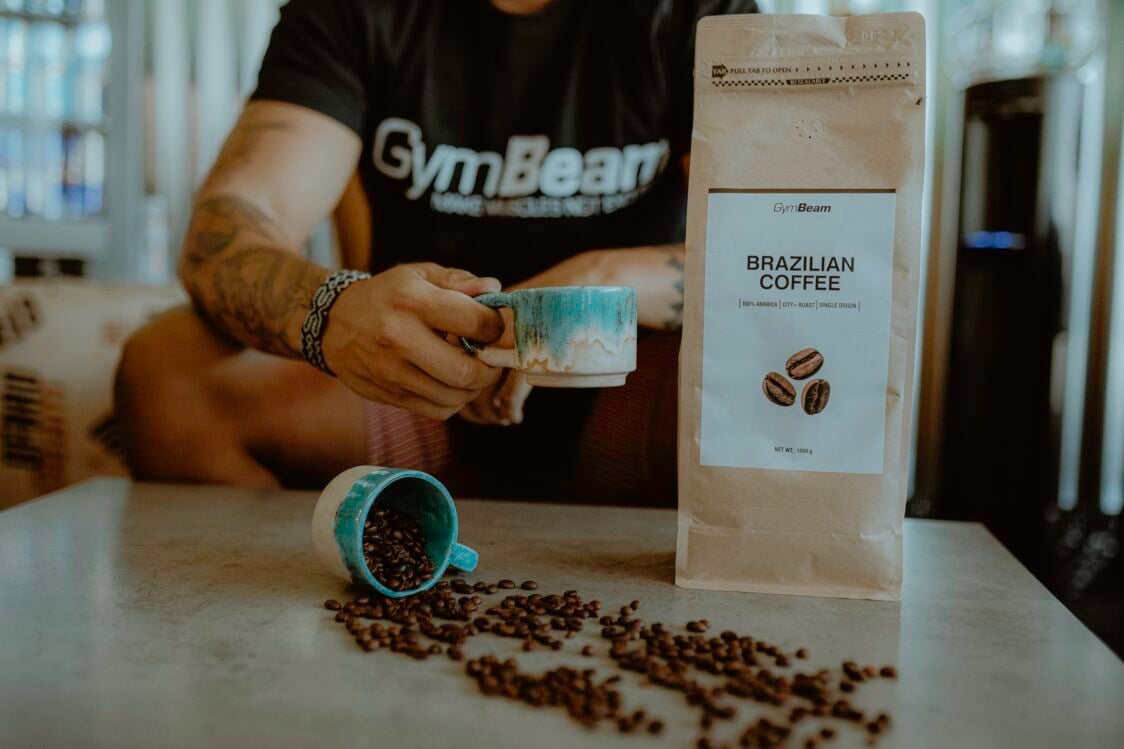Table of Contents
For some, it’s the morning ritual; for others, an occasional treat, while some skip it altogether. We’re talking about one of the most consumed beverages globally: coffee. But what happens to your body when you give it up? Are there any withdrawal symptoms, or is it a walk in the park? In this article, we’ll delve into how caffeine works, its potential benefits, and what happens when you quit.
Coffee is one of the most popular beverages, mainly for its stimulating effects. Did you know that almost 2 billion cups of coffee are consumed worldwide each day? Out of all countries, Finland takes the crown in this contest. Residents of this Nordic country average 4 cups a day per person. Norway follows closely with 3 cups, and Denmark with 2 cups per person daily. [1]
You will certainly not be surprised to learn that caffeine is the substance responsible for the stimulating effects of coffee.
What exactly is caffeine?
Caffeine is a natural compound found in the leaves, seeds, or fruits of plants, acting as a natural insecticide protecting them from pests. It’s most abundant in coffee beans, but is also present in tea leaves, cocoa beans, guarana, and kola nuts. [2]
Where is caffeine mainly found?
Let’s take a closer look at caffeine content in some common sources:
1. Coffee
The amount of caffeine in your favourite cup of coffee varies depending on the type of coffee and how it’s brewed. For instance, your average espresso contains around 80 mg of caffeine. But don’t sleep on instant coffee, as that one is averaging around 30 mg of caffeine per 1 teaspoon. [3]
What about decaf coffee?
You might be surprised to learn that decaf coffee still contains some amount of caffeine. A cup of decaf espresso may contain anywhere from 3 to 16 mg of caffeine. [4]

2. Cocoa Beans and Chocolate
Like coffee beans, cocoa beans also contain caffeine, which is why you’ll find it in chocolate and cocoa. For instance, 100 g of cocoa beans contains an average of 200-300 mg of caffeine. [5, 30]
Every chocolate bar has a certain amount of caffeine, depending on the cocoa percentage it contains. For example, according to the European Food Safety Authority, dark chocolate (100 g) averages around 50 mg of caffeine, while milk chocolate (100 g) contains about 20 mg. A different study found that dark chocolate (100 g) contains approximately 114 mg of caffeine, which is a considerable difference in numbers. [6 – 7]
3. Green Tea
Caffeine is also found in green tea. One cup of this drink contains 30-50 mg of caffeine on average. In addition, it also contains catechins such as epigallocatechin gallate (EGCG), which is the main catechin in green tea. EGCG and caffeine complement each other and work synergistically. Caffeine is absorbed in about 20-45 minutes and the catechins from the tea reach their maximum concentration in the body about 1-2 hours after consumption. [31 – 32]
Did you know that the caffeine content of green tea leaves varies depending on their age? Older leaves have less caffeine than new ones. [8]
Caffeine can also be found in matcha, yerba mate, as well as in energy drinks, gels and shots. It is also a common ingredient in fat burners and pre-workout products.
You might be interested in these products:
How much caffeine is too much caffeine?
According to the European Food Safety Agency, the daily intake of caffeine for a healthy adult weighing 70 kg should not exceed 400 mg. People with higher body weight may have a slightly higher limit. Although it may seem like a high dose, sometimes it’s not that hard to exceed it during the day. Just having 2-3 cups of coffee, green tea, half a bar of dark chocolate, and maybe an energy drink for fatigue, and the limit is exceeded.
For some people, exceeding this limit may cause nothing, while for others, too much caffeine can lead to heart palpitations, nervousness or insomnia. After all, caffeine remains in the body for several hours after consumption, potentially disrupting the quality of your sleep. So it’s wise to consume caffeine in moderation.
How does caffeine work in the body?
Most often, caffeine is consumed for its stimulating effects, as it can suppress fatigue and improve focus. Whether you need a boost before a workout, during exams, or anytime you feel your energy dipping but need to stay active, caffeine comes to the rescue.
But how does this “pick-me-up” actually work?
Our brains contain receptors that interact with adenosine, a substance produced as a byproduct of ATP (adenosine triphosphate) production. Adenosine production occurs continuously throughout the day, with higher levels during periods of physical or mental activity due to increased ATP consumption in the brain. Consequently, adenosine accumulates gradually during waking hours, peaking naturally in the evening, which signals the body to prepare for sleep. Adenosine binds to specific receptors in the brain—when it binds to receptor A1, it induces muscle relaxation and drowsiness, while binding to receptor A2A leads to feelings of fatigue.
And here’s where caffeine comes in. It acts as an antagonist to adenosine receptors, occupying the same receptors and preventing adenosine from doing its job. So, when you have a cup of coffee (or any other source of caffeine), caffeine binds to adenosine receptors. Adenosine won’t have anything to bind to, so its effects—sleepiness or fatigue—don’t kick in. [9]

When does the caffeine kick in, and how long does it stay in your system?
The effects of caffeine typically kick in around 30 to 45 minutes after consumption.
The time it takes for caffeine to be flushed out of the body is called the biological half-life. It’s the duration it takes for your body to reduce the concentration of caffeine in your blood by 50%. The average biological half-life of caffeine is 4 to 6 hours. So, if you have an espresso at, say, 5:00 PM, it’s possible that at 10:00 PM, when you’re heading to bed, your body still has half the amount of caffeine you consumed with the espresso.
The duration caffeine remains in your system is also influenced by your sensitivity to caffeine and the speed of its metabolism, which varies from person to person. Caffeine metabolism depends on several factors, including your genes. It can also take longer, up to 10 hours, for slow caffeine metabolizers, for example. [10]
Once your body metabolizes caffeine, the mentioned receptors in your brain are freed up, and adenosine kicks in again, bringing back fatigue and relaxation.
- If you’re curious about how your genes affect the way you metabolize caffeine, you shouldn’t miss our article on the topic Genes Determine the Impact of Caffeine on the Body. How to Get the Most Out of Its Stimulating Effects?
Can you become dependent on caffeine?
Just like with anything else, moderation is key when it comes to coffee consumption. While coffee, or rather caffeine, can have many positive effects on your health, it all depends on the amount you consume.
The body’s ability to build a tolerance to caffeine also comes into play here. You may have experienced that after a period of drinking coffee, you needed to increase your intake to achieve the same effect. This is when your body has built up a tolerance, requiring you to up your caffeine dosage. Your body gradually begins to increase the number of adenosine receptors in the brain (a process called up-regulation), so the usual amount of caffeine won’t be enough to fill them. Adenosine starts binding to new receptors again, inducing tiredness or drowsiness, even though you’ve had your usual cup of coffee. At this point, the usual amount of caffeine no longer has an effect on you. [11]
While caffeine consumption doesn’t lead to literal addiction, your body can build up a tolerance to it, leading to increased intake and potentially creating a vicious cycle.
Many people opt to increase their caffeine intake, but in the long run, it’s not effective because your body will keep forming more and more new receptors. Moreover, caffeine dosage can easily be misjudged, leading to unpleasant symptoms like heart palpitations or headaches. In this case, a more suitable strategy would be to temporarily reduce caffeine intake or abstain from it for a few days and give yourself a caffeine reset.

What happens to the body when you quit caffeine?
Since the body can develop something akin to physical dependence on caffeine, quitting can lead to typical withdrawal symptoms. How the body responds to quitting caffeine depends on several factors, but mainly on the amount of caffeine it was accustomed to. A study showed that people who consumed caffeine daily experienced more severe withdrawal symptoms than those who consumed it only a few times a week. [12]
When you quit caffeine, you might experience several side effects. But don’t worry, they’re almost always temporary and typically last just a few days. What are the most common symptoms when quitting caffeine?
1. Headaches
One of the most common signs of caffeine withdrawal is headaches. Some scientists suggest that caffeine intake causes blood vessels in the brain to constrict, slowing down blood flow. Quitting caffeine can result in their dilation and increased blood flow, which may lead to headaches. Although quitting caffeine can trigger headaches, paradoxically, it can also be beneficial in combating this unpleasant condition or migraines. However, if your goal is to optimize the effects of caffeine, it’s good to endure these headaches for the first few days. [13 – 14]
2. Fatigue
As we’ve mentioned, caffeine has the ability to block the binding of adenosine in the brain, thereby delaying fatigue. Its elimination can have the opposite effect, increasing fatigue and drowsiness.
3. Anxiety
Many people who quit caffeine also report anxiety. Since the body may have become physiologically and psychologically dependent on caffeine, quitting it can lead to these feelings. [15]
4. Difficulty Concentrating and Brain Fog
Caffeine increases adrenaline levels and the activity of excitatory neurotransmitters like norepinephrine (noradrenaline). This boosts heart rate and blood pressure and stimulates the brain, leading to increased alertness and better concentration. Gradually eliminating caffeine can negatively affect concentration because the body tries to adapt to functioning without it. It can also lead to so-called “brain fog,” where you feel unable to concentrate, easily distracted, have trouble remembering certain information, or cannot focus on work or study. [16 – 17]
5. Reduced Motivation and Drive
Quitting caffeine can also affect motivation and the willingness to work or study. This may be related not only to increased fatigue or decreased ability to concentrate but also to a reduced desire to socialize. [12]
6. Worsening Mood
Caffeine intake not only increases alertness and concentration but also improves mood. Often, caffeine intake is also associated with a reduced risk of depression. For example, a large review of 12 studies found that people who consumed larger amounts of coffee had a 24% lower risk of depression than those who consumed smaller amounts. Therefore, quitting caffeine may temporarily worsen your mood. [18]
7. Irritability
Has you ever been told: “Don’t talk to me until I’ve had my first cup of coffee”? Many people are grumpy and irritable without their coffee. Quitting caffeine can also lead to these symptoms along with moodiness. [15]
Discover our bestsellers:
How to alleviate symptoms when quitting caffeine?
We’ve got some good news. Not only do these symptoms typically last just a few days, but there are also ways to ease them and make the process of quitting caffeine more bearable.
- The first step is to reduce your caffeine intake slowly and gradually. Quitting cold turkey could be a shock to the body. By gradually tapering off, you can avoid unpleasant withdrawal symptoms.
- Another way to make this process easier is to stay hydrated and drink plenty of fluids. Dehydration could worsen symptoms like headache or fatigue.
- Don’t forget about sleep either. Aim for the recommended 7 to 9 hours of quality sleep. This will help you combat fatigue.
- When quitting caffeine, you might have less energy than usual. Try to boost yourself in other ways besides coffee. This could include having a balanced diet rich in fresh fruits and vegetables, as well as exercising, meditating, practising breathing exercises, or cold exposure.
As we mentioned, the adverse symptoms that come after quitting caffeine typically last just a few days and then disappear. After they subside, you can return to drinking coffee and enjoy its beneficial effects on body and mind again. And who knows, you might realize that you don’t need it anymore and decide to stop drinking coffee altogether.
Life without coffee also has its positives. One of them is, for example, better and higher-quality sleep. It has been shown, for example, that people who don’t drink coffee fall asleep much faster. [19]
What are the beneficial effects of caffeine?
Certainly, caffeine shouldn’t be viewed solely in a negative light. In the right and safe amount, besides combating fatigue and providing alertness, caffeine can have numerous positive effects.

1. Improves Athletic Performance
Caffeine is one of the most studied substances for enhancing athletic performance. That’s why it’s a common ingredient in complex pre-workout supplements. It has been shown to have a positive impact on strength, coordination, endurance, and reaction time. These effects on athletic performance may be attributed to reducing fatigue and increasing adrenaline levels after caffeine intake, as well as its ability to stimulate the central nervous system. [20-21]
- Would you like to know more about how caffeine can help you pre-workout? Don’t miss our article Caffeine Before Training: Functions, Benefits, Risks, and Dosage.
2. Promotes Fat Burning and Aids Weight Loss
Caffeine is often a component of fat burners for a reason. Apart from boosting your brain and muscle activity, it can also rev up your metabolism. It has a thermogenic effect, meaning it can increase body temperature in the short term. This requires the body to expend more energy, resulting in burning more calories at rest and during exercise, basically “for free”.
3. Helps Improve Mood
Coffee has been shown to positively affect the mood. The caffeine ingested increases serotonin and dopamine levels in the body. Some studies suggest a connection between coffee consumption and reduced levels of perceived anxiety or a decreased risk of depression. [18, 29]
However, the question remains: to what extent do other factors play a role, factors that studies have not considered? However, you will certainly agree with us that a cup of good coffee, whether alone or in the company of your loved ones, can be a great way to relax, unwind, and kick stress to the curb.
4. Has Positive Health Effects
5. Helps Replenish Antioxidants
You may have heard that coffee contains compounds with antioxidant properties, and it’s true. In fact, it contains more antioxidants than cocoa or green tea. Antioxidants play a crucial role in fighting free radicals in our bodies, which, in excess, could damage our cells and contribute to the development of cardiovascular, metabolic, or neurological disorders. Enjoying a cup of coffee can help replenish these beneficial fighters. [27-28]
What should you remember?
Coffee can undoubtedly be a beneficial part of your day. In the right amount, if not overused, it can have many positive effects. It can support alertness, concentration, boost athletic performance, and aid in fat burning. However, the body can develop a tolerance to caffeine over time, and the same dose may no longer be sufficient.
Therefore, occasionally giving yourself a “caffeine detox” can be beneficial. The body’s reaction to quitting caffeine can vary, especially depending on how much you were accustomed to consuming daily. With smaller doses, the symptoms are milder, while with higher doses, you might experience more discomfort. Symptoms like headaches, fatigue, or irritability typically last only a short while, from a few hours to a few days. If you endure these days, you can return to your favourite cup of coffee and enjoy its benefits again without unnecessary escalation of caffeine intake.
Have you ever tried taking a break from your favourite cup of coffee for a few days? Or are you just now considering it? If you liked the article, support it by sharing it so your friends can learn what happens to their bodies when they stop drinking coffee. Perhaps you’ll inspire someone to take a break from coffee for a while and rediscover its many benefits.
[1] Coffee Consumption by Country in 2024: Top 10 Countries – https://coffeeaffection.com/coffee-consumption-by-country/
[2] REYES, C. M., CORNELIS, M. C. Caffeine in the Diet: Country-Level Consumption and Guidelines – https://www.ncbi.nlm.nih.gov/pmc/articles/PMC6266969/
[3] LUDWIG, I. A., MENA, P., CALANI, L., CID, C., DEL RIO, D., LEAN, M.E., CROZIER, A. Variations in caffeine and chlorogenic acid contents of coffees: what are we drinking? – https://pubmed.ncbi.nlm.nih.gov/25014672/
[4] Decaffeinated Coffee Is Not Caffeine-free, Experts Say – https://www.sciencedaily.com/releases/2006/10/061012185602.htm
[5] KIM, J., KIM, J., SHIM, J., LEE, C.Y., LEE, K.W., LEE, H.J. Cocoa phytochemicals: recent advances in molecular mechanisms on health – https://pubmed.ncbi.nlm.nih.gov/24580540/
[6] Caffeine – https://www.efsa.europa.eu/en/topics/topic/caffeine
[7] ROCHA, P.L.A., LIMA, A.L.C., SAUNDERS, B., REIS, C.E.G. Development of a Caffeine Content Table for Foods, Drinks, Medications and Supplements Typically Consumed by the Brazilian Population – https://www.ncbi.nlm.nih.gov/pmc/articles/PMC9608580/
[8] LIN, Y.S., TSAI, Y.J., TSAY, J.S., LIN, J.K. Factors affecting the levels of tea polyphenols and caffeine in tea leaves – https://pubmed.ncbi.nlm.nih.gov/12643643/
[9] DALY, J.W., BUTTS-LAMB, P. & PADGETT, W. Subclasses of adenosine receptors in the central nervous system: Interaction with caffeine and related methylxanthines – https://link.springer.com/article/10.1007/BF00734999#citeas
[10] THORN, C.F, AKLILLU, E., MCDONAGH, E.M., KLEIN, T.E., ALTMAN, R.B. PharmGKB summary: caffeine pathway – https://www.ncbi.nlm.nih.gov/pmc/articles/PMC3381939/
[11] BOULENGER, J.P., PATEL, J., POST, R.M., PARMA, A.M., MARANGOS, P.J. Chronic caffeine consumption increases the number of brain adenosine receptors – https://pubmed.ncbi.nlm.nih.gov/6298543/
[12] JULIANO, L.M., HUNTLEY, E.D., HARRELL, P.T., WESTERMAN, A.T. Development of the caffeine withdrawal symptom questionnaire: caffeine withdrawal symptoms cluster into 7 factors – https://pubmed.ncbi.nlm.nih.gov/22341956/
[13] NOWACZEWSKA, M., WICIŃSKI, M., KAŹMIERCZAK, W. The Ambiguous Role of Caffeine in Migraine Headache: From Trigger to Treatment – https://www.ncbi.nlm.nih.gov/pmc/articles/PMC7468766/
[14] ADDICOTT, M.A., YANG, L.L., PEIFFER, A.M., BURNETT, L.R., BURDETTE, J.H., CHEN, M.Y., HAYASAKA, S., KRAFT, R.A., MALDJIAN, J.A., LAURIENTI, P.J. The effect of daily caffeine use on cerebral blood flow: How much caffeine can we tolerate? – https://www.ncbi.nlm.nih.gov/pmc/articles/PMC2748160/
[15] SAJADI-ERNAZAROVA, K.R., ANDERSON, J., DHAKAL, A., HAMILTON, R.J. Caffeine Withdrawal – https://www.ncbi.nlm.nih.gov/books/NBK430790/
[16] VOLKOW, N.D., WANG, G.J., LOGAN, J., ALEXOFF, D., FOWLER, J.S., THANOS, P.K., WONG, C., CASADO, V., FERRE, S., TOMASI, D. Caffeine increases striatal dopamine D2/D3 receptor availability in the human brain – https://www.ncbi.nlm.nih.gov/pmc/articles/PMC4462609/
[17] RODAK, K., KOKOT, I., KRATZ, E.M. Caffeine as a Factor Influencing the Functioning of the Human Body—Friend or Foe? – https://www.mdpi.com/2072-6643/13/9/3088
[18] GROSSO, G., MICEK, A., CASTELLANO, S., PAJAK, A., GALVANO, F. Coffee, tea, caffeine and risk of depression: A systematic review and dose-response meta-analysis of observational studies – https://pubmed.ncbi.nlm.nih.gov/26518745/
[19] WATSON, E.J., COATES, A.M., KOHLER, M., BANK,S S. Caffeine Consumption and Sleep Quality in Australian Adults - https://www.ncbi.nlm.nih.gov/pmc/articles/PMC4997392/
[20] 20 Martins, G.L., Guilherme, J.P.L.F., Ferreira, L.H.B., de Souza-Junior, T.P. and Lancha, A.H. Jr. Caffeine and Exercise Performance: Possible Directions for Definitive Findings – https://www.frontiersin.org/articles/10.3389/fspor.2020.574854/full
[21] GUEST, S.N. et al. International society of sports nutrition position stand: caffeine and exercise performance – https://www.tandfonline.com/doi/full/10.1186/s12970-020-00383-4
[22] MAIA, L., DE MENDONÇA, A. Does caffeine intake protect from Alzheimer's disease? – https://onlinelibrary.wiley.com/doi/10.1046/j.1468-1331.2002.00421.x
[23] HERNÁN, M.A. et al. A meta-analysis of coffee drinking, cigarette smoking, and the risk of Parkinson's disease – https://onlinelibrary.wiley.com/doi/10.1002/ana.10277
[24] CORRAO, G., ZAMBON, A., BAGNARDI, V., D'AMICIS, A., KLATSKY, A. Collaborative SIDECIR Group. Coffee, caffeine, and the risk of liver cirrhosis – https://pubmed.ncbi.nlm.nih.gov/11557177/
[25] LARSSON, S.C., ORSINI, N. Coffee consumption and risk of stroke: a dose-response meta-analysis of prospective studies – https://pubmed.ncbi.nlm.nih.gov/21920945/
[26] Coffee consumption and health: umbrella review of meta-analyses of multiple health outcomes – https://www.bmj.com/content/359/bmj.j5024
[27] SVILAAS, A., SAKHI, A.K., ANDERSEN, L.F., SVILAAS, T., STRÖM, E.C., JACOBS, D.R. JR, OSE, L., BLOMHOFF, R. Intakes of antioxidants in coffee, wine, and vegetables are correlated with plasma carotenoids in humans – https://pubmed.ncbi.nlm.nih.gov/14988447/
[28] ZARIC, B.L., MACVANIN, M.T., ISENOVIC, E.R. Free radicals: Relationship to Human Diseases and Potential Therapeutic applications – https://www.sciencedirect.com/science/article/abs/pii/S1357272522001911?via%3Dihub
[29] NEHLIG, A., DAVAL, J.L., DEBRY, G. Caffeine and the central nervous system: mechanisms of action, biochemical, metabolic and psychostimulant effects – https://pubmed.ncbi.nlm.nih.gov/1356551/
[30] TEMPLE, J.L., BERNARD, C., LIPSHULTZ, S.E., CZACHOR, J.D., WESTPHA,L J.A., MESTRE, M.A. The Safety of Ingested Caffeine: A Comprehensive Review – https://www.ncbi.nlm.nih.gov/pmc/articles/PMC5445139/
[31] PERVIN, M., UNNO, K., TAKAGAKI, A., ISEMURA, M., NAKAMURA, Y. Function of Green Tea Catechins in the Brain: Epigallocatechin Gallate and its Metabolites – https://www.mdpi.com/1422-0067/20/15/3630
[32] Green Tea Extract – https://examine.com/supplements/green-tea-extract/research/


Add a comment